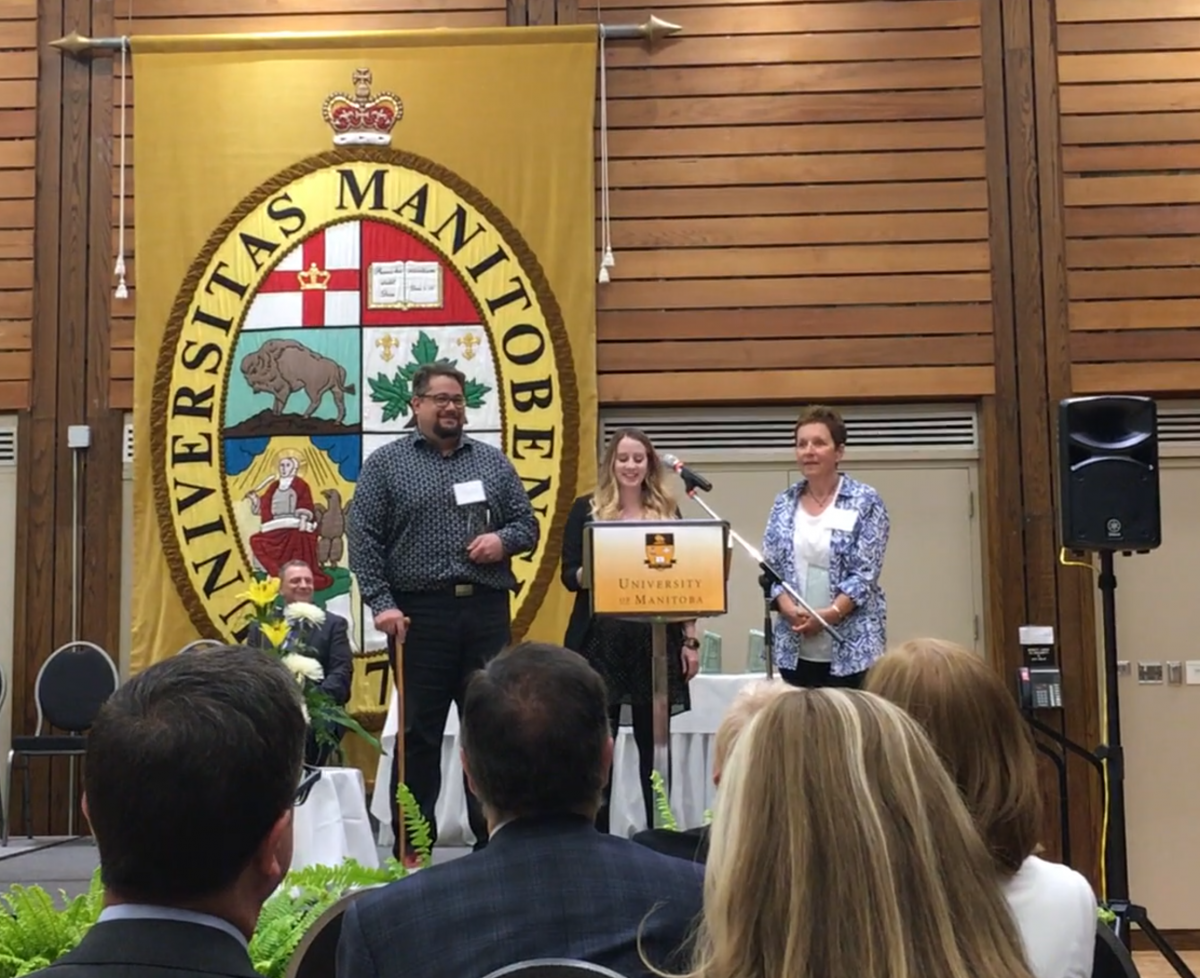
Graduating law student Zita De Sousa recognizes law professor Dr. Richard Jochelson and high-school English teacher, Ms. Debbie Boyko at the 2018 STRR.
Outstanding Law Student recognizes teachers who inspired her to achieve goals
Zita De Sousa graduates this spring from Robson Hall Faculty of Law, intent on pursuing a career in the criminal justice system. On Monday, May 15 at the 2018 Students’ Teacher Recognition Reception (STRR), she expressed heartfelt thanks to two teachers who inspired her in the face of adversity to achieve her goals. Selected as the Faculty of Law’s Outstanding Student for this year’s STRR, she in turn chose her grade 12 student advisor and English teacher from Maples Collegiate, Ms. Debbie Boyko, and Faculty of Law Associate Professor Richard Jochelson to stand with her as Outstanding Teachers.
The Centre for the Advancement of Teaching and Learning has been hosting the STRR awards for the past 26 years, to give outstanding students the chance to honour teachers who have made important contributions throughout their educational careers from earliest years (K – 12) to post-secondary experiences at the University of Manitoba. A student from each faculty is selected and invited to speak at the reception about the impact their honoured teachers have made on their lives. According to The Centre, almost 900 teachers have been recognized since the initiative began.
De Sousa said she was “shocked” when invited to be Law’s choice for the award. “I don’t really consider myself “outstanding,”” she said in an interview with the Faculty of Law, “but I knew I did have some amazing teachers who I would love to honour, so I said yes immediately.”
Boyko was De Sousa’s most memorable choice for a K – 12 teacher. “She was both a fantastic teacher and also helped me during a difficult time in my life,” said De Sousa. In her reception speech, De Sousa credited Boyko for teaching her to be a critical thinker upon recognizing her love of reading, and for going above and beyond the call of duty to help and encourage De Sousa at a time when she was experiencing great personal difficulties. Having been her student advisor from grades 9 to 12, Boyko was a role model for De Sousa as “a strong, intelligent female.”
Being the first person in her family to go to university, De Sousa said she was thankful for having met Dr. Richard Jochelson in her undergraduate years, who was teaching at the University of Winnipeg at the time, and who she said “taught classes that opened my eyes to issues that our society has faced.” In his classes, she became passionate about Canada’s criminal justice system, and thanked Jochelson for helping her “focus that passion to advocacy.”
After almost having given up on her dream to go to law school due to personal circumstances, De Sousa said Jochelson “took every step to make sure I knew I could go to law school and that I was capable and deserving.”
As luck would have it, Jochelson joined the faculty at Robson Hall soon after De Sousa started her studies in law. Knowing him from before, she approached him with concerns about whether or not her empathetic temperament would allow her to successfully pursue criminal advocacy as a career. “He told me my feelings were not a weakness, but a strength,” she said. “Having him here at Robson Hall during such a pivotal time is something that I will be forever grateful for.”
Jochelson himself was surprised and honoured that De Sousa chose him as her Outstanding post-secondary teacher. “I was very glad to have been a small part of Zita’s journey as she moved through life’s challenges,” he said. “Zita has really developed her voice as a legal advocate and I expect we will see great things from her in the years to come.”
Generally, Jochelson said he tries to get students to be interested in what they are learning and to treat learning itself as a skill to be developed. “More and more I realize learning is about instilling a process of discovery and investigation in students as opposed to the imparting of wisdom,” he said. “I aspire for a classroom that is a community of learners, where students support each other and where achievement is defined by what we learn together.”
Different students need different supports, he said. “In Zita’s case, she simply needed to know that the world was open to a person like her, and that the only barriers she could face were ones that she had already overcome in her previous life challenges.”
Qualities De Sousa said she most appreciated in a teacher were enthusiasm and compassion. “Both of the educators I nominated were not only experts in what they taught, they really cared about the students well-being, both inside and outside the classroom,” she said, adding that she herself would love to teach some day. “I’d love to “pay it forward” and help students the way I’ve been helped in the past.”
The most distinctive lesson she said she learned from her two teachers is that, “every single person is worthy, is capable of doing great things – they just need to be inspired and supported.”
At the reception, De Sousa concluded her speech with a quote from William A. Ward: “The mediocre teacher tells. The good teacher explains. The superior teacher demonstrates, but a great teacher inspires. Both of these individuals have inspired me and as I embark on a career in the criminal justice system, one where I hope to effect positive change in society, I will do so in their honour. For Inspiring me, for carrying me at times, and for believing in me when I didn’t believe in myself.”






